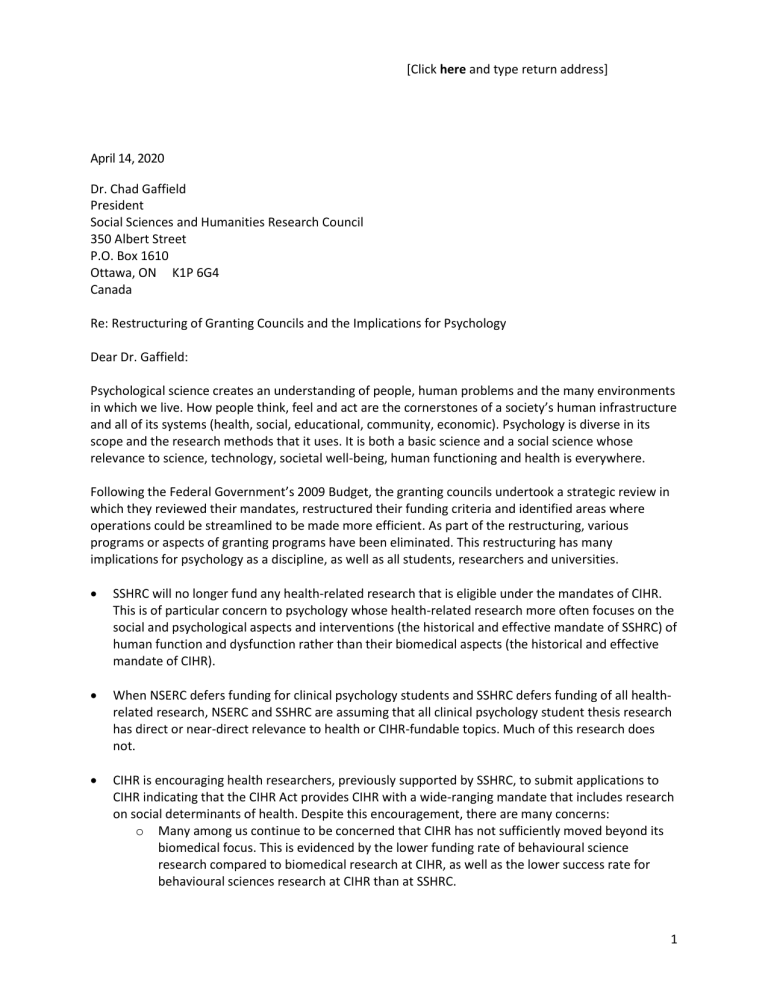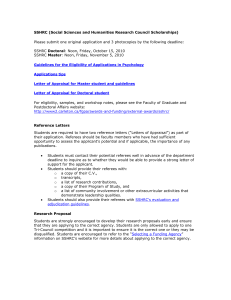sshrc - Canadian Psychological Association

[Click here and type return address]
April 14, 2020
Dr. Chad Gaffield
President
Social Sciences and Humanities Research Council
350 Albert Street
P.O. Box 1610
Ottawa, ON K1P 6G4
Canada
Re: Restructuring of Granting Councils and the Implications for Psychology
Dear Dr. Gaffield:
Psychological science creates an understanding of people, human problems and the many environments in which we live. How people think, feel and act are the cornerstones of a society’s human infrastructure and all of its systems (health, social, educational, community, economic). Psychology is diverse in its scope and the research methods that it uses. It is both a basic science and a social science whose relevance to science, technology, societal well-being, human functioning and health is everywhere.
Following the Federal Government’s 2009 Budget, the granting councils undertook a strategic review in which they reviewed their mandates, restructured their funding criteria and identified areas where operations could be streamlined to be made more efficient. As part of the restructuring, various programs or aspects of granting programs have been eliminated. This restructuring has many implications for psychology as a discipline, as well as all students, researchers and universities.
SSHRC will no longer fund any health-related research that is eligible under the mandates of CIHR.
This is of particular concern to psychology whose health-related research more often focuses on the social and psychological aspects and interventions (the historical and effective mandate of SSHRC) of human function and dysfunction rather than their biomedical aspects (the historical and effective mandate of CIHR).
When NSERC defers funding for clinical psychology students and SSHRC defers funding of all healthrelated research, NSERC and SSHRC are assuming that all clinical psychology student thesis research has direct or near-direct relevance to health or CIHR-fundable topics. Much of this research does not.
CIHR is encouraging health researchers, previously supported by SSHRC, to submit applications to
CIHR indicating that the CIHR Act provides CIHR with a wide-ranging mandate that includes research on social determinants of health. Despite this encouragement, there are many concerns: o Many among us continue to be concerned that CIHR has not sufficiently moved beyond its biomedical focus. This is evidenced by the lower funding rate of behavioural science research compared to biomedical research at CIHR, as well as the lower success rate for behavioural sciences research at CIHR than at SSHRC.
1
o Many faculty are also concerned about the likelihood of their students being awarded CIHR funding if they themselves have not been CIHR-funded. o It is very important to ensure that research proposals are being judged by officers and committees who have the sufficient knowledge in the research area as well as familiarity with the discipline in which it is conducted to competently and fairly evaluate its merits.
When NSERC defers funding for clinical psychology students and SSHRC defers funding of all healthrelated research, NSERC and SSHRC are assuming that all clinical psychology student thesis research has direct or near-direct relevance to health or CIHR-fundable topics. Much of this research does not.
Students carrying out such research should not be disenfranchised from fellowship funding or judged by committees less knowledgeable about these applications than others. These funding decisions fragment, rather than support the inter-disciplinarity of psychological research. Preeminent examples of researchers at risk are:
the clinical psychology student whose combination of field of study and research will not meet the
eligibility criteria of any of the granting Councils; the health psychology researcher whose focus on psychological etiology and interventions of human functioning and problems will render his work ineligible for SSHRC funding and at risk of not being funded by CIHR because of its lack of biomedical focus; and
the social psychology researcher whose interest in the personality development may be perceived as health research by SSHRC and social science research by CIHR and effectively funded by neither.
Core funding of the Councils is not only essential to the advancement of knowledge but also provides the platform within which graduate student research takes place. While disciplines and the growing inter-disciplinarity of research are comfortable with permeable boundaries, the granting agencies clearly are not – the most recent restructuring creates silos whereas knowledge is being best created through transit ways. A particular risk of siloed research funding for psychology is that some of its researchers, because of their area of specialty or area of research, will have no access to funding.
As per the Canadian Psychological Associations’ position paper on this issue, I call upon SSHRC to ensure that psychological research that does not have an immediate health focus continues to have a home
at SSHRC. Where to draw the line on what research is and is not related to health is difficult but an important consideration in psychological science. Research that focuses on personality development or group behavior has a home in the social sciences not health. Further, it is important to ensure that research proposals are being judged by officers and committees who are sufficiently knowledgeable about the applications of research.
I ask that you consider the position taken in this letter and ensure that core funding is in place to advance knowledge and ensure that all graduate student research can take place.
Sincerely,
[Click here and type your name]
[Click here and type job title]
2






